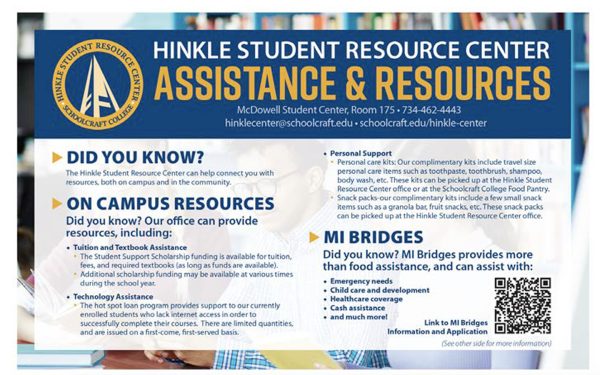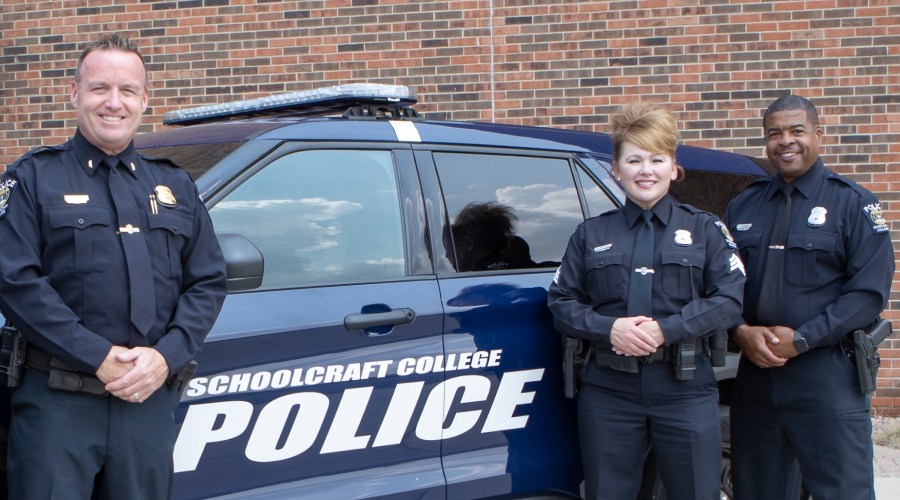Something no student should experience is home insecurity and homelessness.
Unfortunately it is present on college campuses. Schoolcraft however wastes no time to provide not only the support, but resources and opportunities to give students an assisting hand.
In many cases, students become homeless due to traumatic personal life situations, like abuse from a loved one or getting kicked out of residences with no resources to relocate. That is what happened to a current Schoolcraft sophomore Nursing student who asked to stay anonymous, but had to remove themselves from a household due to a domestically violent relationship and struggled to find housing; almost losing everything.
“This is not what I wanted to happen, and I didn’t expect it to happen. I had to leave my house and it caused me to lose my job, fall back on my studies and almost lose my apartment [that I had moved into],” said the Nursing student. “I couldn’t start off my semester because [my partner] broke my laptop and other things I needed for school. I had to just fight all the way out to get out of that situation.”
Understandably those who don’t have a secure home are also prevented from achieving their goals, pushing themselves to their full potential, hindering academic focus and performance due to the turmoil and stress of not having that sense of stability. This is exactlywhat the Nursing student described to be their experience and after confiding in their Schoolcraft Academic Advisor Laura Haldane, they were directed to go to the Hinkle Student Resource Center for support.
“[The Hinkle Student Resource Center] were very concerned, they were very nice young ladies and they were really trying to help me with my situation to get better so I could continue to pursue my dream and my nursing career,” said the Nursing student. “I received emergency assistance, which helped out a lot and at least gave me some support.”
The student was also able to receive financial aid to pay for their classes, allowing them to focus on their education rather than trying to pay for it. This was a major step for them as, like many other students in similar situations, felt embarrassed to ask for help and anticipate being patronized when attempting to receive help. This was not the case for the Nursing student and was grateful for reaching out to the Hinkle Student Resource Center.
“Sometimes a student might come with a concern about a class or having a rough semester, and then that conversation evolves into ‘why have you been struggling?’ I have heard students say they didn’t have somewhere to live, living in their car, living on their friend’s couch,” said Haldane. “So then that becomes a question of obviously there’s not much an advisor can do about that, but the [Hinkle Student Resource Center Coordinator Rhonda Donovan] has those resources through some community partners and other funding that they have to help assist students.”
 Students are often referred to the two-woman run (but mighty) Hinkle Student Resource Center from academic advisors, faculty and other students for aid. The department offers support like home insecurity aid, food resources, transportation referrals, scholarships to help pay for classes, licensed counseling and is affiliated with many programs like MI Bridges to get students the help they need.
Students are often referred to the two-woman run (but mighty) Hinkle Student Resource Center from academic advisors, faculty and other students for aid. The department offers support like home insecurity aid, food resources, transportation referrals, scholarships to help pay for classes, licensed counseling and is affiliated with many programs like MI Bridges to get students the help they need.
“Telling someone you’re homeless is very hard. When I meet with a homeless student, I let them do the talking and with the information they want to share, I usually try to assist them through referrals to community partners with crisis housing resources,” said Donovan. “I also provide them with gift cards for gas, refer them to the Student Food Pantry (for eating on campus) and mental health services since facing eviction or being homeless is overwhelming.”
However, with all of these resources how are there still homeless students on campus?
Like the Nursing student’s story, home insecurity has a negative connotation and stigma attached; thus students may feel uncomfortable or ashamed to reach out for help. Interestingly enough, some students don’t consider themselves to be homeless, so they simply don’t reach out for aid.
A big proponent of homelessness is not being aware of resources available and what they may likely qualify for, which is the biggest takeaway of bringing awareness and support to our peers, as well as recognizing possible signs that they are struggling.
“Students who are falling asleep in class can be a sign of maybe they’re sleeping in a car, they’re not getting good rest because of other issues going on,” said Haldane. “Or, if you see a student may be wearing the same outfit every day: some people have more limited wardrobes, but that can be another sign that they’re facing or dealing with something.”
Some of those visual cues, but also being attentive to each other can lead to a big impact on that student and very well get them into a better situation. If you do see something, utilize SC Aware to make a report.
As uncomfortable a topic it may be for those experiencing insecurity, whether it is housing or something else going on in their life, Schoolcraft does provide the resources and outreach to support them. If you do see someone struggling or in need, or you are in need yourself, please don’t be ashamed to ask for help. This is what a community is for.
For more information on the Hinkle Student Resource Center, go to https://www.schoolcraft.edu/hinkle-center/ or contact 734-462-4443 or [email protected].










